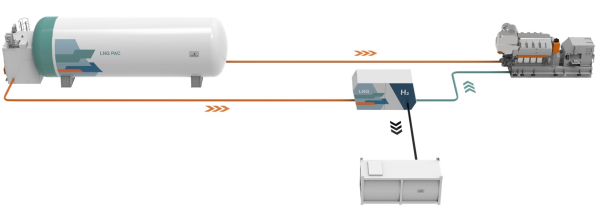
The technology group Wärtsilä has entered into a joint development agreement with Hycamite TCD Technologies, a privately-owned Finnish company specializing in the development of technology for the thermo-catalytic decomposition (TCD) of methane to produce clean hydrogen and solid carbon. The two companies will work together to enable cost-effective production of hydrogen from LNG onboard marine vessels.
The concept design will be ready by mid 2023 and the prototype testing unit will be ready during the second half of 2024.
The concept will allow the existing LNG infrastructure to be utilized and enable production of hydrogen onboard in combination with Wärtsilä’s LNGPac Fuel Gas Supply System. By producing hydrogen onboard and blending it with LNG, the current range of fuel flexible Wärtsilä dual-fuel (DF) engines can reduce the vessel’s overall carbon dioxide and methane slip emissions. Alternatively, the hydrogen can also be used in fuel cells onboard.
The technology can in principle be applied for all vessels operating with LNG fuel. When using bioLNG, this solution enables even power generation on board ships with a negative carbon footprint.
The by-product from the process is solid carbon that, unlike conventional technologies which produce carbon-dioxide as a by-product, can more easily be stored and managed onboard. The carbon produced consists of high-grade allotropes, such as industrial graphite and carbon nanotubes, thereby offering a possible additional revenue stream.
We are investing in the development of viable future marine fuel technologies and solutions that can accelerate the efforts to decarbonise shipping operations. This collaboration with Hycamite is an important step forward towards meeting our corporate targets. Our gas engines can already operate with mixtures of hydrogen and LNG. The ability to produce the H2 onboard opens up exciting new opportunities. This solution overcomes the lack of an existing hydrogen supply infrastructure. It also supports reducing the safety risks around storing and handling of liquid hydrogen and enables a gradual decrease of the vessels’ environmental impact.
—Mathias Jansson, Director, Fuel Gas Supply Systems, Wärtsilä